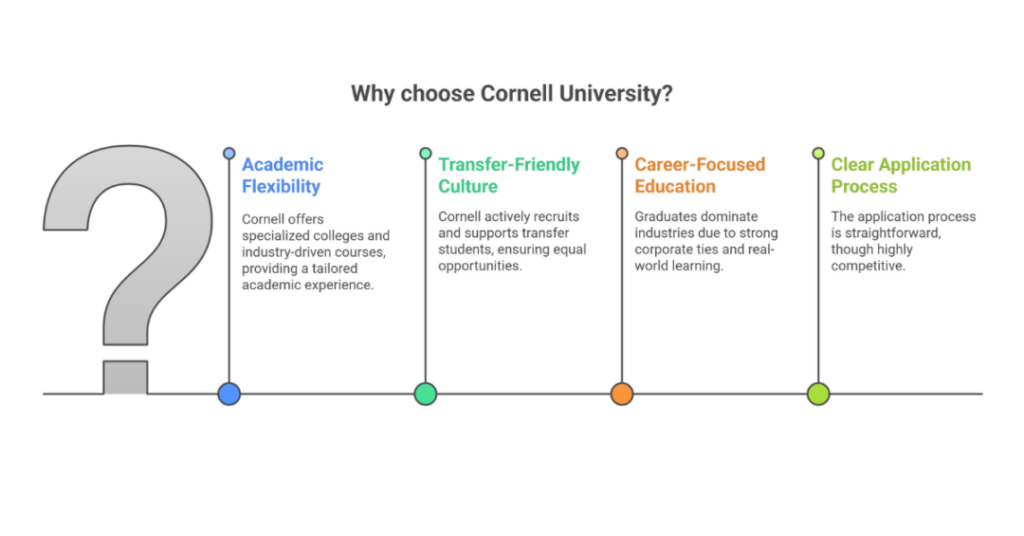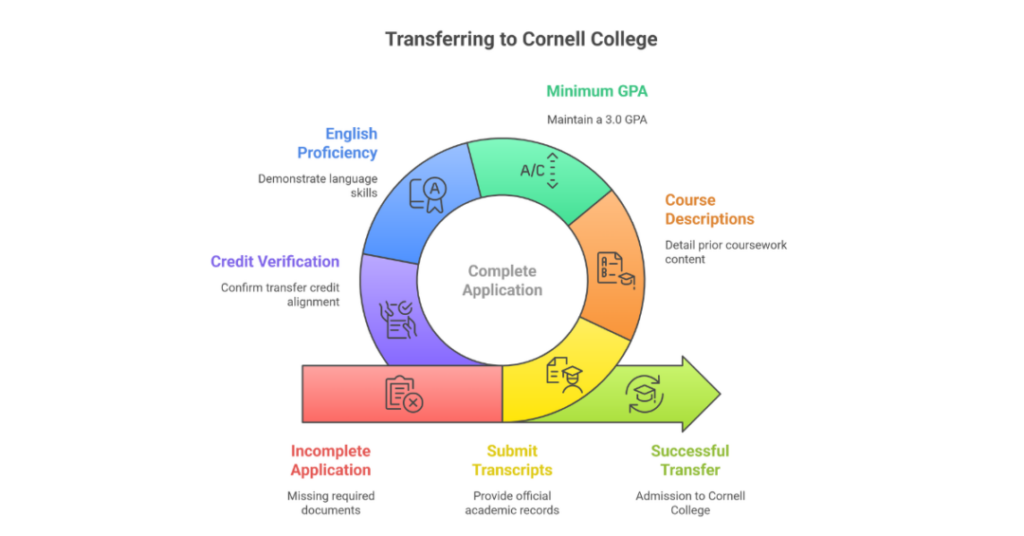30 July 2025
6 minutes read
What Are The Cornell University Transfer GPA Requirements For Admission?

Key Takeaways
- Cornell transfer GPA requires a minimum GPA of 3.0 is required, but a GPA of 3.5 or higher makes you competitive.
- Meeting transfer requirements is crucial Completing the right course requirements and submitting a strong writing supplement increases your chances.
- Not all applicants get in Many students apply, but only those who fulfill transfer expectations and show clear academic goals are accepted.
A 3.5 GPA or higher gives you a competitive edge as a transfer applicant to Cornell, but some colleges within Cornell may consider a minimum 3.0 GPA. Sounds simple? It’s not. Transfer admission at Cornell is highly selective, and a strong GPA alone won’t guarantee acceptance. Many transfer students struggle because they underestimate the importance of required coursework, supplemental essays, and aligning their major with Cornell’s academic expectations. If you’re serious about getting in, you need more than just good grades—you need a well-planned strategy tailored to Cornell’s specific undergraduate admissions criteria.
Why Should You Choose Cornell University?
Cornell isn’t just any Ivy League school. It’s the one that actually makes sense. You’re not paying for a brand name; you’re paying for a future. Whether you’re an external transfer or one of the first-year applicants, Cornell doesn’t just hand out degrees—it builds careers.

But here’s the catch: It’s not for everyone. If you want an easy ride, look elsewhere. If you want world-class education, unparalleled networking, and an alumni base that runs industries, keep reading.
1. Unmatched Academic Flexibility
Cornell isn’t just a university; it’s a collection of specialized colleges designed to give students the perfect academic fit. Whether you’re applying to the SC Johnson College of Business or the College of Agriculture and Life Sciences, you get access to industry-driven courses, cutting-edge research, and professors who don’t just teach from textbooks—they write them.
2. A Transfer-Friendly Culture
Most top-tier universities make external transfer students feel like second-class citizens. Cornell University doesn’t. In fact, it actively recruits transfer students, giving them the same opportunities as those who started as first-year applicants. The support system is solid, and with the right strategy, you can carve out an equally successful path.
3. A Degree That Pays for Itself
Cornell graduates don’t just land jobs—they dominate industries. The university’s strong ties to major corporations, startups, and research institutions mean you’re not just earning a diploma; you’re building a career from day one. And if you’re applying to the SC Johnson College of Business, expect to be recruited before you even graduate.
4. Real-World Learning, Not Just Theory
Whether you’re in the College of Agriculture and Life Sciences or studying business, engineering, or the arts, Cornell ensures you don’t just learn—you do. From hands-on labs to real-world consulting projects, everything is designed to make you job-ready.
5. The Application Process is Clear (But Not Easy)
Cornell isn’t one of those schools with hidden application rules. The requirements are clear: complete the common application fee, submit strong essays, and meet the application deadline—but getting in? That’s another story. The process is highly competitive, and knowing the ins and outs (like answering those tricky frequently asked questions) can make or break your chances.
What Is The Cornell University Transfer GPA Requirement For Admission?
You want to transfer to Cornell—but do you actually have what it takes? A high cumulative GPA is great, but it’s just the start. Thousands of students apply as a transfer each year, but only those who meet the strict admissions requirements and complete the right course requirements make it through. Whether you’re coming from community colleges, another institution, or outside the U.S., Cornell’s admissions committee is looking for more than just grades. Let’s break down exactly what you need to be considered for transfer and how to position yourself as one of the successful applicants.
Cornell has multiple schools, and each has its own transfer requirements, required courses, and expectations. While In US universities a minimum GPA of 3 is necessary for most programs, competitive applicants typically have a GPA of 3.5 or higher.
| Cornell College/School | Minimum GPA | Competitive GPA | Additional Transfer Requirements |
|---|---|---|---|
| College of Arts and Sciences | 3.0 | 3.5+ | Strong coursework in intended major, writing supplement required |
| CALS (College of Agriculture and Life Sciences) | 3.0 | 3.5+ | CALS major must be declared, meet course requirements |
| College of Human Ecology | 3.0 | 3.5+ | Must align with a cals major, show clear career goals |
| Nolan School of Hotel Administration | 3.0 | 3.5+ | Prior hospitality/business experience strongly preferred |
| SC Johnson College of Business | 3.3 | 3.7+ | Strong business-related coursework, transfer credit review required |
| Engineering | 3.5 | 3.8+ | Must meet rigorous course requirements, math and science focus |
| College of Architecture, Art, and Planning | 3.0 | 3.5+ | Portfolio required for architecture and fine arts applicants |
Cornell Transfer Application Requirements
If you wish to transfer and continue your education at Cornell College, we are pleased to offer transfer options for students seeking to join one of our schools at Cornell.

Whether you plan to enroll in fall 2024 or submit transfer applications for spring 2024, the admissions team welcomes qualified students to apply as an external transfer. To successfully transfer to Cornell, applicants must note the following:
- Accepting external transfer applications for both fall 2024 and spring 2024 enrollment; you may apply to the college for this option at any time during the application cycle.
- Applicants must have graduated from high school and be enrolled at a current college, having completed college-level coursework in courses of study relevant to their desired major, including sciences majors.
- The admissions office requires a minimum GPA of at least a 3.0 to be considered, with preference given to applicants who have shown outstanding academic potential and readiness for graduation requirements at Cornell.
- Students must complete the form available on the application status page, along with submitting course descriptions, syllabus copies for prior classes, and official transcripts.
- English language proficiency, like IELTS and TOEFL, is required for students outside the U.S., and proof must be submitted at the time of application.
- Applicants must work closely with the director of undergraduate studies to confirm transfer credits and verify alignment with graduation requirements.
- Due to first-year enrollment restrictions and the depth of our curriculum, Cornell may be unable to offer admission to many applicants, though we offer admission to many applicants who have shown exceptional academic preparation.
- For students holding an IB diploma, college-level credit may be awarded toward continuing your education at Cornell after review by the admissions team.
- Applicants will receive updates via the application status page and can track decisions and next steps.
- The admissions office and our team look forward to working with transfer students and ensuring a smooth transition as we welcome transfer students into our diverse community.
By following these steps and demonstrating readiness to meet Cornell’s graduation requirements, transfer applicants can maximize their chances to join a school at Cornell and thrive while continuing your education.
Cornell Transfer GPA & SAT/ACT
To apply as a transfer to any college at Cornell, students submitting external transfer applications for spring must have completed college-level coursework with a minimum GPA of 3.0. Standardized tests like SAT/ACT are optional but can strengthen applications, especially for those outside the U.S. seeking to demonstrate academic readiness. Competitive applicants typically exceed minimums to secure admission, ensuring they meet Cornell’s rigorous expectations for transfer students.
Conclusion
Cornell is not easy—but that’s exactly why it’s worth it. If you’re just looking for a school to accept your transfer before application deadline and move on, this isn’t the place. But if you’re willing to put in the work, meet the admissions requirements, and prove that you’re more than just a GPA, Cornell will give you opportunities most schools can’t.
The admissions committee isn’t just looking for students who check boxes. They want those who understand their college or school, have taken the right course requirements, and can contribute to Cornell’s academic environment. Whether you’re coming from community colleges or an accredited college or university, you’ll need to show how you align with Cornell’s degree requirements and why you’re a good fit.
When you want to get into a top U.S. university it isn’t just about grades—it’s about strategy. Ambitio’s AI-powered platform and expert consultants help you tackle applications, study gaps, and visa approvals with confidence. No confusion, no wasted time—just a clear path to your dream school. So if you want to study in USA, Ambitio is the answer.
FAQs
What is the minimum GPA requirement for transfer applicants to Cornell?
The minimum GPA for consideration varies, but a competitive GPA is generally above 3.0.
Can I transfer to Cornell from a community college?
Yes, Cornell accepts transfer applicants from community colleges, provided they meet the academic and coursework requirements.
What are the application deadlines for transfer applicants?
Transfer application deadlines vary, so it’s essential to check Cornell’s admissions website for specific dates.
Is there a specific application process for international transfer applicants?
International transfer applicants follow the same process as domestic applicants but must also demonstrate English language proficiency.
When is the deadline to submit a transfer application?
Cornell is accepting external transfer applications for fall 2024 and has limited spots for external transfer applications for spring 2024.
Do I need to submit a writing supplement with my transfer application?
Yes, most schools require a writing supplement, especially if you apply to CALS, the College of Human Ecology, or the SC Johnson College of Business.

You can study at top universities worldwide!
Get expert tips and tricks to get into top universities with a free expert session.
Book Your Free 30-Minute Session Now! Book a call now




























